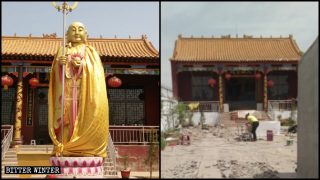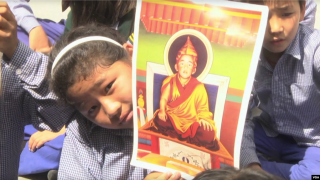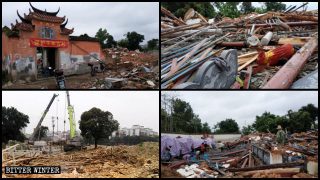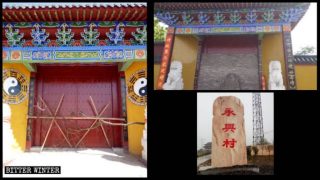The CCP is sealing off Buddhist and Taoist temples nationwide. Even the ashes of the deceased are unable to find peace.
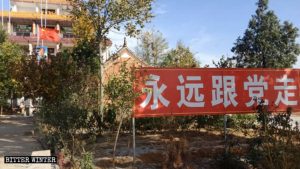
Xin Lu
Taoist and Buddhist temples sealed off
On April 19, several government officials from Naodian town, under the jurisdiction of Pingdingshan city in central China’s Henan Province, arrived at a local Taoist temple called Tianyi Temple and ordered the person in charge of the temple to remove all faith-related symbols. They claimed that, “it is a private religious venue and is illegal.” They even demanded that the Taoist priest remove his Taoist robe, cut his hair and return to secular life by moving out of the temple. Traditionally, Taoist priests keep their hair long.
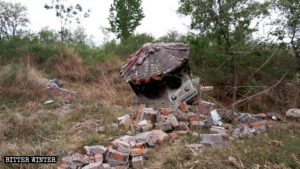
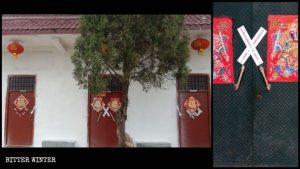
Subsequently, the officials smashed the temple’s incense burner and put up barricade tapes across all of the temple’s doors, barring people from entering or exiting. Having left home many years ago and with nowhere to go, the temple’s Taoist priest had no choice but to stay in a small kitchen in the temple.
The same day, not far from the Taoist temple, a Buddhist temple named Xiangyan Temple was also sealed off on the grounds that it was “unlicensed.” Government officials savagely threw the temple’s kitchen supplies into the yard and ordered the temple’s owner to immediately move out. Again, barricade tapes were put up across the temple’s entrance.
“Now, people must do whatever the government says. If you resist them, the temple will be torn down,” a local village official said, as reported by local Buddhists to Bitter Winter.
The following day, workers were ordered to spray white paint over the Taoist temple and to cover all the religious symbols on the wall of Xiangyan Temple, so that people cannot discern that they are places of worship.
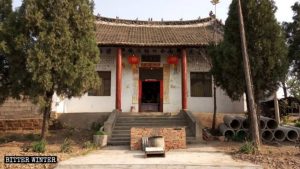
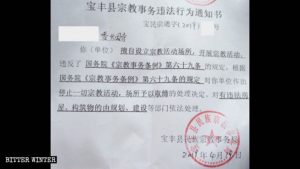
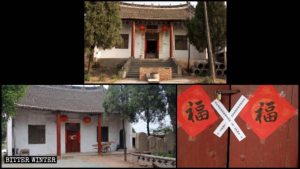
Old Buddhist nun left with nowhere to go
In March, a Guanyin temple in Yuci district of Jinzhong city, in north China’s Shanxi Province, was also cordoned off, and government officials ordered a Buddhist nun in her 70s to leave the temple, saying it wasn’t recognized or put on file by government departments.
The Buddhist nun produced her ordination certificate, but the officials completely disregarded it. They forcibly sent her to a hospital and sent village officials to watch over her.
It wasn’t until two days later that she was allowed to leave the hospital, but by that time, the temple had already been sealed off.
“I wasn’t sick at all! The reason they kept me under control at the hospital was so they could seal off the temple,” the elderly Buddhist nun told Bitter Winter.
According to local villagers, this nun had lived at the temple for 16 years.
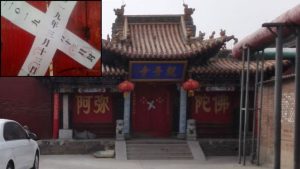
“No peace” for ashes of deceased Buddhists
It is not only living persons who are suffering from the crackdown—even dead believers are unable to rest in peace. The government ordered the removal of the ashes of Buddhist believers stored in Zhenjiang Pagoda in Hantai district of Hanzhong city in northwest China’s Shaanxi Province.
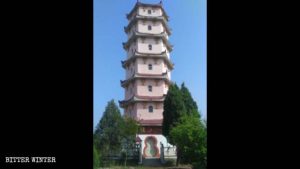
In July 2018, the government ordered the unconditional removal of the ashes of deceased Buddhists stored in Zhenjiang Temple’s Zhenjiang Pagoda, which included a columbarium, i.e. a room or building where funeral urns are stored. The reason given was that part of the funding for building Zhenjiang Pagoda was paid by the persons whose ashes were stored within, which was regarded by the government as commercialization of the temple.
“There was no commercialization at all involved in building the columbarium. It was for the sole purpose of fulfilling the wishes and Buddhist affinities of believers,” a temple regular told Bitter Winter. He added that each of the temple’s householders contributed 3,000 RMB (about $ 430) and, coupled with donations from believers, a total of 400,000 RMB (about $ 60,000) was spent to build the columbarium in 2012.
As reported by local believers to Bitter Winter, an official from the local United Front Work Department threatened the temple’s abbot, saying: “This is a campaign. You know about the demolition of temples on Qinling Mountains. Whatever the government wants you to do, you have to do it. Don’t give any conditions or excuses! All the ashes must be cleared out within one week. If you don’t cooperate, we’ll use an excavator to forcibly tear down the pagoda.”
In order to save the pagoda, the abbot was forced to move the ashes of 22 Buddhists stored in the pagoda to another place, angering the temple’s worshippers.
“The government is going too far in bullying people. Even the dead haven’t been spared,” one of them told us.
source:BITTER WINTER/Xin Lu
